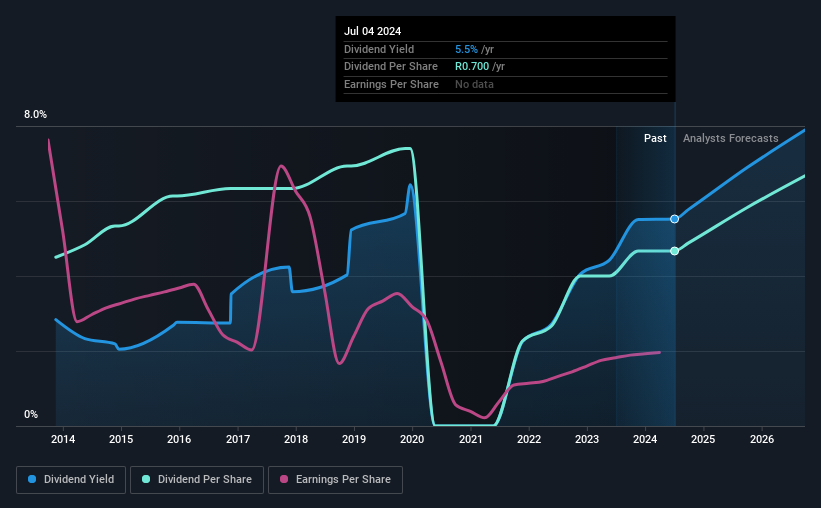- South Africa
- /
- Healthcare Services
- /
- JSE:NTC
Why It Might Not Make Sense To Buy Netcare Limited (JSE:NTC) For Its Upcoming Dividend

Readers hoping to buy Netcare Limited (JSE:NTC) for its dividend will need to make their move shortly, as the stock is about to trade ex-dividend. Typically, the ex-dividend date is one business day before the record date which is the date on which a company determines the shareholders eligible to receive a dividend. The ex-dividend date is of consequence because whenever a stock is bought or sold, the trade takes at least two business day to settle. Meaning, you will need to purchase Netcare's shares before the 10th of July to receive the dividend, which will be paid on the 15th of July.
The company's next dividend payment will be R00.30 per share, and in the last 12 months, the company paid a total of R0.70 per share. Based on the last year's worth of payments, Netcare has a trailing yield of 5.5% on the current stock price of R012.68. We love seeing companies pay a dividend, but it's also important to be sure that laying the golden eggs isn't going to kill our golden goose! That's why we should always check whether the dividend payments appear sustainable, and if the company is growing.
Check out our latest analysis for Netcare
Dividends are typically paid from company earnings. If a company pays more in dividends than it earned in profit, then the dividend could be unsustainable. Netcare paid out 66% of its earnings to investors last year, a normal payout level for most businesses. Yet cash flow is typically more important than profit for assessing dividend sustainability, so we should always check if the company generated enough cash to afford its dividend. Over the past year it paid out 164% of its free cash flow as dividends, which is uncomfortably high. It's hard to consistently pay out more cash than you generate without either borrowing or using company cash, so we'd wonder how the company justifies this payout level.
Netcare paid out less in dividends than it reported in profits, but unfortunately it didn't generate enough cash to cover the dividend. Were this to happen repeatedly, this would be a risk to Netcare's ability to maintain its dividend.
Click here to see the company's payout ratio, plus analyst estimates of its future dividends.

Have Earnings And Dividends Been Growing?
Stocks in companies that generate sustainable earnings growth often make the best dividend prospects, as it is easier to lift the dividend when earnings are rising. If earnings decline and the company is forced to cut its dividend, investors could watch the value of their investment go up in smoke. This is why it's a relief to see Netcare earnings per share are up 3.6% per annum over the last five years. Earnings have been growing somewhat, but we're concerned dividend payments consumed most of the company's cash flow over the past year.
The main way most investors will assess a company's dividend prospects is by checking the historical rate of dividend growth. It looks like the Netcare dividends are largely the same as they were 10 years ago.
Final Takeaway
Should investors buy Netcare for the upcoming dividend? Netcare is paying out a reasonable percentage of its income and an uncomfortably high 164% of its cash flow as dividends. At least earnings per share have been growing steadily. Bottom line: Netcare has some unfortunate characteristics that we think could lead to sub-optimal outcomes for dividend investors.
With that being said, if you're still considering Netcare as an investment, you'll find it beneficial to know what risks this stock is facing. Case in point: We've spotted 2 warning signs for Netcare you should be aware of.
A common investing mistake is buying the first interesting stock you see. Here you can find a full list of high-yield dividend stocks.
Valuation is complex, but we're here to simplify it.
Discover if Netcare might be undervalued or overvalued with our detailed analysis, featuring fair value estimates, potential risks, dividends, insider trades, and its financial condition.
Access Free AnalysisHave feedback on this article? Concerned about the content? Get in touch with us directly. Alternatively, email editorial-team (at) simplywallst.com.
This article by Simply Wall St is general in nature. We provide commentary based on historical data and analyst forecasts only using an unbiased methodology and our articles are not intended to be financial advice. It does not constitute a recommendation to buy or sell any stock, and does not take account of your objectives, or your financial situation. We aim to bring you long-term focused analysis driven by fundamental data. Note that our analysis may not factor in the latest price-sensitive company announcements or qualitative material. Simply Wall St has no position in any stocks mentioned.
Have feedback on this article? Concerned about the content? Get in touch with us directly. Alternatively, email editorial-team@simplywallst.com
About JSE:NTC
Netcare
An investment holding company, operates private hospitals in South Africa.
Proven track record with adequate balance sheet.
Similar Companies
Market Insights
Community Narratives



